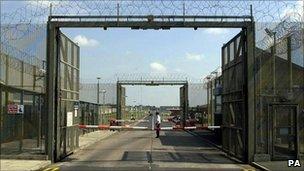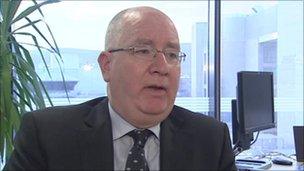NI jails failing despite having more staff than inmates
- Published

The report examines the management arrangements and working practices used within the NI Prison Service
The Northern Ireland prison service is ineffective even though there are more people working in jails than there are inmates to supervise, a new report has found.
The Criminal Justice Inspection (CJI) report described industrial relations in NI prisons as "destructive".
The cost of housing inmates was almost £95,000 a year - two and a half times more than anywhere else in the UK.
But despite that, there are deep-seated problems, says the report.
BBC NI Home Affairs correspondent Vincent Kearney said: "The prison service should be well used to negative reports by now - there have been dozens in recent years.
"But the latest, by Criminal Justice Inspection, is one of the most comprehensive, and one of the most critical.
"It says management failings mean the authorities are unable to deliver an effective prison service, or real, meaningful change."
Mr Kearney added: "The inspectors say management practices and industrial relations must improve if major reform is to take place."
The report is the latest in a series of critical reviews of prisoner care; revelations about failings in the observation of vulnerable inmates and, in the last two months, the wrongful release of three prisoners, including an accused rapist.
The CJI found that of 1,300 recommendations made in previous reports, 600 remained outstanding.
It said "deep-seated" problems are preventing the development of a properly functioning system.

Dr Maguire said there were deep-seated problems
The report pointed out that there are almost 1,900 uniformed officers and 400 support staff for Northern Ireland's 1,500 prison population, yet there are often problems with staffing levels.
The staff-to-prisoner ratio is far larger than other parts of the UK.
Officers in the region are also paid a third more than their counterparts in Scotland, England and Wales.
Therefore the cost of housing inmates in Northern Ireland is also a lot higher. It stands at £95,000 a year compared to an average of £45,000 elsewhere in the UK.
The Prison Officers Association is also criticised in the report. Industrial relations are described as "destructive" and inspectors said the union has been able to exercise a "de facto veto" over change.
Dr Michael Maguire, Chief Inspector of Criminal Justice in Northern Ireland, said that each report the inspectorate had carried out since 2004 had shown "deep-seated problems" existed throughout the system, the only exception being an inspection of Magilligan Prison in 2010.
The report highlights areas where the service has been unable to improve including the length of time prisoners spend out of their cells and their access to work, education and constructive activities.
"The Prison Service has at its disposal 1,883 uniformed grade officers and almost 400 civilian grade staff members.
"Yet, there are many occasions when local working practices create insufficient staffing levels to deliver an effective service, which has exposed management to a reliance on the goodwill of staff to make the prison work," said Dr Maguire.
The chief inspector said that in order to bring about real change the prison service needed to deal with weak management and poor industrial relations along with leadership and accountability issues.
Justice Minister David Ford said the case for fundamental reform was undeniable.
"This important report highlights fundamental problems within the prison service that go beyond the operational issues which the service and I have been wrestling with in recent months," he said.
"The service cannot remain in its current form. Fundamental change is essential, otherwise the failures of recent months will be repeated."
He added: "We cannot ignore, when we look at the industrial relations, what prison officers went through in the 70s, 80s and 90s.
"We cannot ignore the fact that 29 of their colleagues were killed because they worked for the prison service.
"We have to recognise that society has changed and there is now a need to do things in a different way."
Chairman of the Prison Officers Association Finlay Spratt described the CJI report as "sensationalised".
"It is the people who are paid quite substantial amounts of money to manage the NI Prison Service that's putting the burden on taxpayers. It's centralisation, it's the criminal justice inspectorate team, justifying their existence.
"I accept and acknowledge that changes have to be made in the prison service. But it will not be made by quangos, armchair generals."